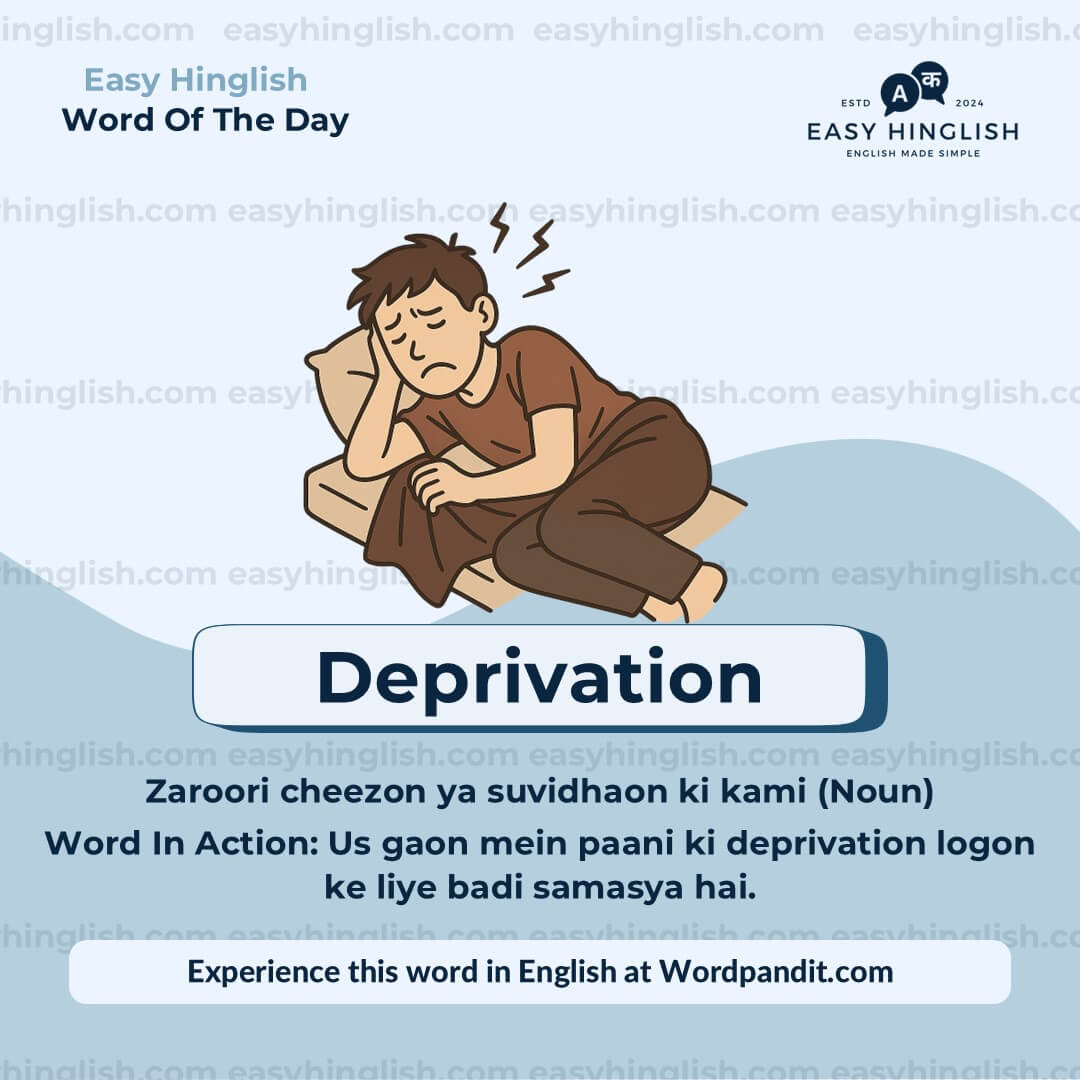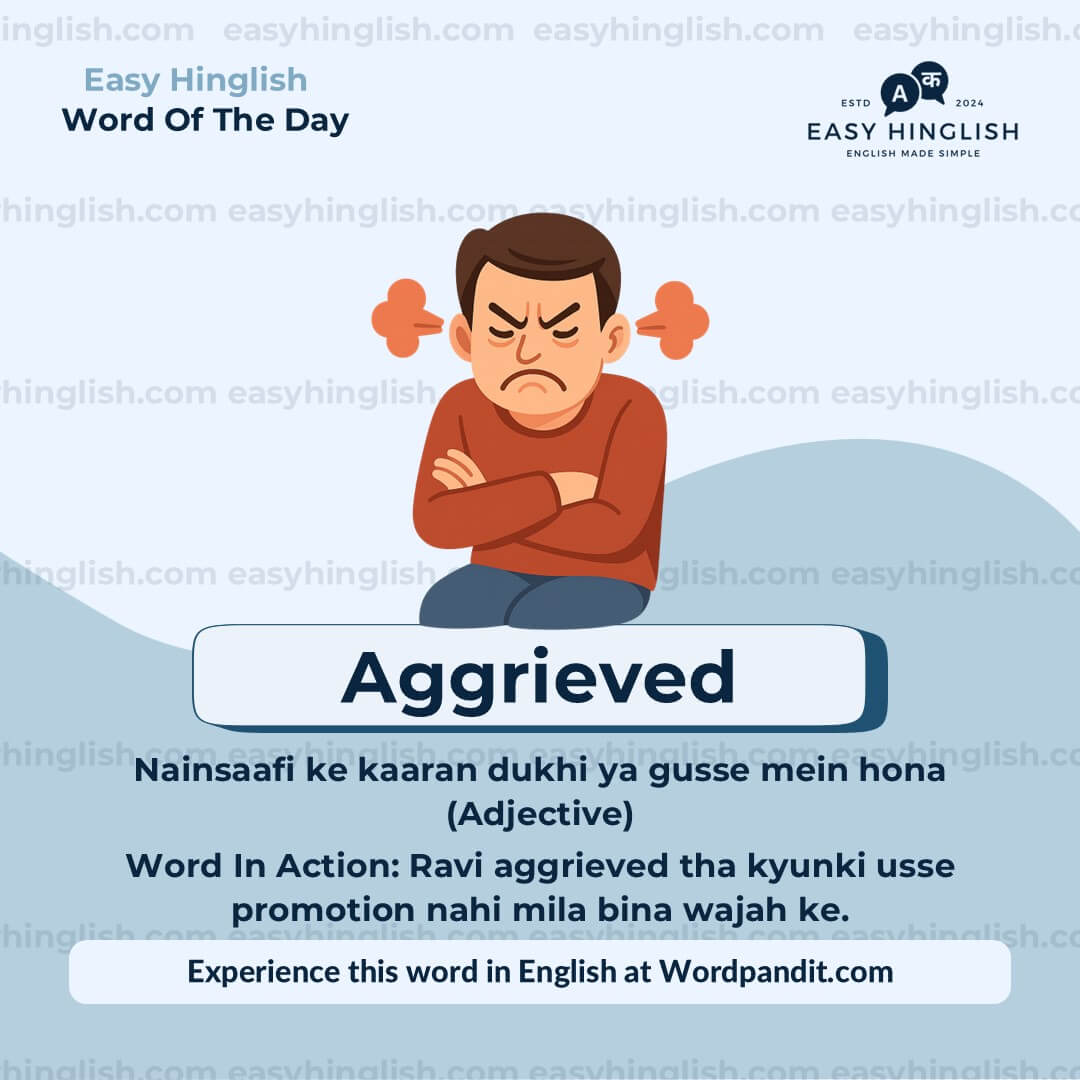Daily Vocabulary Indian Newspapers aur Publications se Seekho
Welcome to Wordpandit ka Indian Vocabulary Hub
Wordpandit par, hum samajhte hain ki ek achhi vocabulary develop karne ke liye local context samajhna bhi zaroori hai. Is section ka focus hai aapke vocabulary ko India ke leading newspapers aur publications se naye shabdon aur phrases ke zariye improve karna, taaki aap practical, relevant, aur uniquely Indian words seekh sakein.
Indian Sources Itne Important Kyun Hain?
Hum maante hain ki kisi bhi language ko sikhne ka sabse best tareeka hai uske local content me immerse hona. Isi wajah se hum carefully words curate karte hain top Indian newspapers aur publications se, jaise:
- The Hindu
- The Times of India
- The Economic Times
- Hindustan Times
- Live Mint
- The Indian Express
- Aur bhi bahut saare...
Hamesha Updated Raho, Hamesha Relevant Raho
Daily updates ke saath, aap Indian news sources se naye words seekhoge jo Indian society aur culture ke latest trends ko reflect karte hain. Hamara focus hai aise words provide karna jo aapke liye real-world me useful ho.
Wordpandit Aapke Learning Goals Ko Kaise Support Karta Hai?
Chahe aap exams ki preparation kar rahe ho, professional communication improve karna chahte ho, ya sirf naye words seekhna chahte ho, Wordpandit har step par aapki madad karega.
Practical Tareeke Se Seekho
Hamari interactive learning methodology me real-world examples, engaging activities, aur context-based usage shamil hain, taaki har naya shabd aapki active vocabulary ka hissa ban sake.
Aaj Hi Indian Vocabulary Seekhna Shuru Karo!
Wordpandit Kyun Choose Karein?
Practical Learning: Aise words seekho jo aapko real-world reading aur communication me sach me kaam aayenge, taaki aapki comprehension aur bolne ki skills improve ho.
Diverse Content: Current affairs se lekar scientific breakthroughs tak, hamare different sources aapko multiple domains ka vocabulary sikhate hain.
Effortless Integration: Wordpandit ko apni daily routine ka part banao. Sirf kuch minute har din dene se aapki vocabulary time ke saath kaafi improve ho sakti hai.
Aapka Vocabulary Mastery Tak Ka Safar
- Regularly hamare Daily Vocabulary section ko visit karo
- Naye words explore karo aur unka context me use samjho
- In words ko apni writing aur bolne ki practice me use karne ki koshish karo
- Jaise-jaise aapke words badhte hain, apni progress ko track karo
Aaj Se Apni Vocabulary Journey Shuru Karo!
Wordpandit ke saath vocabulary improve karna start karo. Roz thoda effort dalne se aap ek strong vocabulary develop kar sakte ho jo academic, professional, aur personal life me kaafi kaam aayegi.
Yaad rakho, ek naya shabd roz seekhna linguistic limitations ko door karne ka best tareeka hai! Wordpandit ko apni daily learning journey ka sathi banao aur vocabulary excellence ki taraf badho!
WORD-1: Deferential
Sandarbh (Context):
"Although many imagine that to be a more deferential era, some of the squibs were more vulgar and cruel than anything that would appear in the mainstream media today." - The Wire
Vyakhya (Explanatory Paragraph):
"Deferential" ek aisa behavior hota hai jisme aap kisi aur ke opinion, position ya authority ko izzat dete ho. Jaise jab koi student teacher se baat karta hai polite tareeke se, ya employee apne boss ki baat bina argue kiye maan leta hai—yeh sab deferential attitude ke examples hain. Yeh word dikhata hai ki aap kisi ko upar mante ho aur uski baat ko respect karte ho.
Arth (Meaning): Respect dikhane wala ya kisi aur ki authority ke samne jhukne wala (Adjective)
Uccharan (Pronunciation): def-uh-REN-shuhl
Kathinai Star (Difficulty Level): ⭐⭐⭐
Utpatti (Etymology): "Deference" se aaya hai, jo Latin ke "deferre" se nikla hai—iska matlab hota hai "to yield" ya jhukna.
Prashant Sir Ke Tathya (Prashant Sir's Notes):
Yeh word formal ya hierarchical settings mein bahut useful hai—jaise student-teacher, employee-boss, citizen-leader. Dhyan rahe: Respectful hona achha hai, lekin agar aap hamesha jhukte hi rahte ho, toh log aapko chamcha bhi samajh sakte hain.
Samanarthi & Vipritarthi (Synonyms & Antonyms):
Samanarthi (Synonyms): respectful, obedient, submissive, humble, reverent
Vipritarthi (Antonyms): disrespectful, insolent, defiant, rude, insubordinate
Udaharan (Usage Examples):
- Intern ne CEO se baat karte waqt ekdum deferential tone use kiya.
- Usne professor ko question poochhne se pehle respectfully head nod kiya—ek deferential gesture.
Sanskritik Sandarbh (Cultural Reference):
"Japanese culture mein log highly deferential hote hain—bowing ek common gesture hai respect dikhane ke liye." - Cultural Atlas
Sochiye (Think About It):
Kya hamesha deferential rehna kabhi kabhi galat cheezon ke against khade hone se rokta hai?
Chhoti Kriya (Quick Activity):
Do short dialogues likho—ek jisme koi person deferential ho aur doosra jisme woh defiant ho. Tone aur result ko compare karo.
Yaad Karne Ka Tarika (Memory Tip):
“Defer” yaani kisi aur ki baat maan lena. Isme “-ential” jod do aur ban jaata hai ek adjective—jo batata hai ki aadmi dusre ko respect se treat kar raha hai.
Vastavik Jeevan Me Upyog (Real-World Application):
"Deferential" ka use formal emails ya job interviews mein hota hai—agar aap kisi organization ke liye apply kar rahe ho toh aapka tone deferential hona chahiye, jo respect dikhata hai.
WORD-2: Deprivation
Sandarbh (Context):
"Argue that this more accurately reflects ‘the challenges of deprivation’ than the conventional measure of poverty. While they conclude that both measures have ‘pros and cons’ and they are not stating a preference." - The Wire
Vyakhya (Explanatory Paragraph):
"Deprivation" ka matlab hota hai kisi aisi zaroori cheez ka na hona jo insaan ke basic jeevan ke liye important hoti hai—jaise khana, ghar, pyaar, ya sammaan. Jab koi bacha bina emotional support ke bada hota hai, ya ek family income ki kami se basic needs poori nahi kar paati, toh unhe deprivation ka samna karna padta hai. Yeh word poverty se aage jaake deeper issues ko highlight karta hai.
Arth (Meaning): Zaroori cheezon ya suvidhaon ki kami (Noun)
Uccharan (Pronunciation): dep-ri-VAY-shun
Kathinai Star (Difficulty Level): ⭐⭐⭐
Utpatti (Etymology): Latin word "deprivare" se aaya hai, jiska matlab hai "to rob" ya cheen lena.
Prashant Sir Ke Tathya (Prashant Sir's Notes):
"Deprivation" sirf gareebi nahi batata, balki kisi bhi important cheez ki kami ko dikhata hai—chahe woh sleep ho, emotion ho, ya social support. Isliye yeh word social science, psychology aur development studies mein bahut common hai. Dhyan do phrases par jaise "sleep deprivation", "emotional deprivation", "economic deprivation".
Samanarthi & Vipritarthi (Synonyms & Antonyms):
Samanarthi (Synonyms): hardship, poverty, destitution, lack, scarcity
Vipritarthi (Antonyms): abundance, wealth, luxury, plenty, affluence
Udaharan (Usage Examples):
- Deprivation ke environment mein bade hue bachche school mein struggle karte hain.
- Yudh ke kaaran logon ko severe food deprivation ka samna karna pada.
Sanskritik Sandarbh (Cultural Reference):
"Sleep deprivation ek aisi technique thi jo Guantanamo Bay jaisi jagon mein prisoners ko mentally torture karne ke liye use ki jaati thi." - Human Rights Watch Report
Sochiye (Think About It):
Kya ek ameer society mein bhi deprivation ho sakta hai? Agar haan, toh woh kaise forms mein dikhta hai?
Chhoti Kriya (Quick Activity):
Teen tarah ki deprivation likho—physical, emotional, aur social—aur har ek ka ek real-life udaharan do.
Yaad Karne Ka Tarika (Memory Tip):
"Deprive" yaani "cheen lena"—aur jab aapse kuch zaroori cheez chheen li jaaye, toh jo haal hota hai usse kehte hain "deprivation."
Vastavik Jeevan Me Upyog (Real-World Application):
"Deprivation" ka concept samajhna un fields mein important hai jahan aap social inequality, development ya health issues handle karte ho—jaise ki social work, psychology, ya public policy.
WORD-3: Indigenous
Sandarbh (Context):
"The steps that should be followed are to study the PLA in detail; decide on technologies to be built indigenously and those to be procured from friendly nations." - The Wire
Vyakhya (Explanatory Paragraph):
"Indigenous" ka matlab hota hai koi aisi cheez ya vyakti jo kisi particular jagah ka asli ya mool niwasi ho. Ye shabd aksar native communities, plants, ya cultures ke liye use hota hai. Aajkal iska use local technology aur products ke liye bhi hota hai—jaise “indigenous technology” ka matlab hai desh mein hi bani hui technique, bina kisi foreign madad ke. Ye word asliapan aur local identity ko highlight karta hai.
Arth (Meaning): Jo kisi particular jagah mein naturally ya originally paya jaata ho; mool niwasi (Adjective)
Uccharan (Pronunciation): in-DIJ-uh-nus
Kathinai Star (Difficulty Level): ⭐⭐⭐
Utpatti (Etymology): Latin word "indigenus" se aaya hai, jiska matlab hai "born in a country" yaani kisi desh mein hi janma hua.
Prashant Sir Ke Tathya (Prashant Sir's Notes):
"Indigenous" pehle sirf native logon ke liye use hota tha, lekin aaj yeh politics aur economy mein bhi popular hai—jaise “indigenous manufacturing,” jo local development ko highlight karta hai. Context ke hisaab se iska meaning shift karta hai—yeh important point hai samajhne ke liye.
Samanarthi & Vipritarthi (Synonyms & Antonyms):
Samanarthi (Synonyms): native, local, homegrown, domestic, original
Vipritarthi (Antonyms): foreign, imported, alien, non-native, external
Udaharan (Usage Examples):
- Amazon ke indigenous tribes ne sadiyon se prakriti ke saath harmony mein jeevan bitaya hai.
- Sarkar ne indigenous defense technologies ko promote karne ka naya programme shuru kiya hai.
Sanskritik Sandarbh (Cultural Reference):
"Indigenous Peoples’ Day" USA mein Native American communities ke history aur contributions ko celebrate karta hai—yeh Columbus Day ke alternate ke roop mein maana jaata hai. - NPR
Sochiye (Think About It):
Globalization ke daur mein kya indigenous knowledge aur practices ko preserve karna zaroori hai? Kyon?
Chhoti Kriya (Quick Activity):
Apne desh se ek indigenous community, ek indigenous plant, aur ek indigenous technology ka naam likho. Har ek ko thoda describe karo.
Yaad Karne Ka Tarika (Memory Tip):
Socho “in-digenous” — yaani “in the region” — matlab jo kisi jagah ka asli ho, jo wahi ka ho.
Vastavik Jeevan Me Upyog (Real-World Application):
"Indigenous" word ka use environmental science, social justice, manufacturing aur public policy jaise areas mein hota hai—yeh local innovation, native rights aur self-reliance ke concepts ko highlight karta hai.
WORD-4: Aggrieved
Sandarbh (Context):
"In promoting a ‘religious nationalism’ propped by BJP alliances with ‘upper caste Hindus, aggrieved middle class, the business community,’ ‘governance is not the point’ for the ‘partisan, ideological formation that is the Hindutva project.’" - The Wire
Vyakhya (Explanatory Paragraph):
"Aggrieved" un logon ke liye use hota hai jo kisi tarah se nainsaafi ya anyaay se guzarte hain aur is wajah se andar hi andar resentment ya gussa mehsoos karte hain. Ye feeling personal bhi ho sakti hai aur social ya political bhi. Jab kisi community ko lagta hai ki unke saath unfair treatment hua hai, aur unka dard sunne wala koi nahi, toh woh aggrieved feel karte hain. Aksar yeh emotional state protest, voting behavior ya political movements ko fuel karta hai.
Arth (Meaning): Nainsaafi ke kaaran dukhi ya gusse mein hona (Adjective)
Uccharan (Pronunciation): uh-GREEVD
Kathinai Star (Difficulty Level): ⭐⭐⭐
Utpatti (Etymology): Old French ke "agrever" se aaya hai—jiska matlab hota hai kisi cheez ko aur bura banana; Latin "ad-" (to) + "gravis" (heavy) se milkar bana hai—yaani ek emotional burden jaisa feel karna.
Prashant Sir Ke Tathya (Prashant Sir's Notes):
"Aggrieved" sirf sadness nahi dikhata—yeh ek deeper sense of unfairness ko capture karta hai. Legal aur political language mein yeh word commonly aata hai. Jaise “aggrieved citizens” ya “aggrieved party” court cases mein. Jab kisi group ko lagta hai ki unki sunwai nahi ho rahi, toh yeh shabd unke emotional state ko perfectly describe karta hai.
Samanarthi & Vipritarthi (Synonyms & Antonyms):
Samanarthi (Synonyms): resentful, offended, hurt, disgruntled, wronged
Vipritarthi (Antonyms): content, satisfied, pleased, appeased, gratified
Udaharan (Usage Examples):
- Aggrieved employee ne discrimination ke khilaaf complaint file ki.
- Bahut saare aggrieved log unfair policies ke khilaaf protest karne sadak par aa gaye.
Sanskritik Sandarbh (Cultural Reference):
Literature aur film mein aggrieved characters often rebellion ya justice ke centre mein hote hain—jaise *The Hunger Games* ki Katniss Everdeen, jo Capitol ke oppression se aggrieved thi. - Dystopian narratives ka analysis
Sochiye (Think About It):
Kya aggrieved hone ki feeling hamesha conflict ko badhawa deti hai, ya kabhi kabhi positive social change bhi la sakti hai?
Chhoti Kriya (Quick Activity):
Ek short paragraph likho jisme koi vyakti ya samudaay aggrieved mehsoos karta ho. Batayein ki unka dard kis wajah se tha aur uske response mein kya action hua.
Yaad Karne Ka Tarika (Memory Tip):
Socho: "aggrieved" = "aggravated + grieved" — yaani kisi nainsaafi ke kaaran gussa aur dukh dono mehsoos karna.
Vastavik Jeevan Me Upyog (Real-World Application):
Legal documents aur political speeches mein "aggrieved" ka use hota hai un logon ya groups ke liye jo nainsaafi se pareshaan hain aur kisi tarah ka justice ya compensation chahte hain.
WORD-5: Complacency
Sandarbh (Context):
"Over time, however, the nation slips back into complacency, awaiting another incident to reignite its fury. From Mathura, to Nirbhaya to R.G. Kar, the cycle of tragedy remains unbroken." - The Wire
Vyakhya (Explanatory Paragraph):
"Complacency" ka matlab hota hai jab koi insaan ya samudaay apne haal se itna zyada khush ya comfortable ho jaata hai ki woh existing problems ko ignore karne lagta hai. Ismein alertness ki kami hoti hai, aur lagta hai sab kuch theek hai—even jab clearly problems hoti hain. Yeh ek aisi mental state hai jo progress ko rok sakti hai aur serious issues ke against action lene se logon ko passiv bana deti hai.
Arth (Meaning): Apne haal se itna khush hona ki aage ke khatron ya problems ki chinta na karna (Noun)
Uccharan (Pronunciation): kum-PLAY-sen-see
Kathinai Star (Difficulty Level): ⭐⭐⭐
Utpatti (Etymology): Latin shabd "complacere" se nikla hai, jiska matlab hota hai “bahut zyada khush karna”—lekin iska aarth evolve hoke ban gaya “overly content” yaani zarurat se zyada khush rehna.
Prashant Sir Ke Tathya (Prashant Sir's Notes):
Complacency ek silent danger hai—jab sab thik lagta hai, tabhi woh chhupke se ghus jaata hai. Yeh growth aur accountability dono ko block karta hai. Social issues, personal goals ya institutional reforms—sab mein complacency ek barrier ban sakta hai. Is word ka use tab karo jab logon mein alertness ya urgency ki kami dikh rahi ho.
Samanarthi & Vipritarthi (Synonyms & Antonyms):
Samanarthi (Synonyms): smugness, self-satisfaction, indifference, apathy, contentment
Vipritarthi (Antonyms): vigilance, concern, dissatisfaction, awareness, urgency
Udaharan (Usage Examples):
- Manager ne team ko early wins ke baad complacency se bachne ke liye warn kiya.
- Climate change ko lekar public complacency ek badi rukaawat ban gayi hai real action ke liye.
Sanskritik Sandarbh (Cultural Reference):
George Orwell ki *1984* novel mein government public ki complacency ka fayda uthakar unhe surveillance aur jhooth mein fasaye rakhti hai—log indifferent ho gaye hote hain isliye resistance nahi karte. - Literary analysis
Sochiye (Think About It):
Comfort kis point par jaake complacency ban jaata hai? Kaise ek vyakti ya samudaay us tipping point ko pehchaan sakta hai?
Chhoti Kriya (Quick Activity):
Apne jeevan ya aas-paas ke environment se do situations likho jahan complacency progress ko rok rahi ho. Har ek case mein ek chhota sa step suggest karo jo us situation ko improve kar sakta hai.
Yaad Karne Ka Tarika (Memory Tip):
Socho: "Complacency" tab aata hai jab aap kisi cheez se itne pleased ho jaate ho ki problems dikhti hi nahi—yaani "pleasantly blind" ho jaate ho real issues ke prati.
Vastavik Jeevan Me Upyog (Real-World Application):
Leadership, activism, aur personal growth ke areas mein complacency ko samajhna critical hai—yeh batata hai kab hume alert hone ki zarurat hai taaki hum stagnation se bachein aur progress ki taraf badhein.













